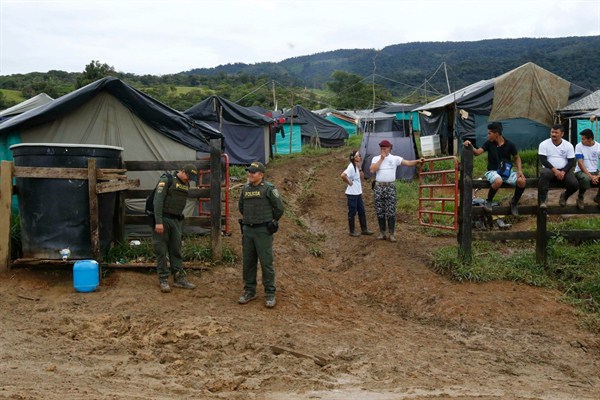When he took office earlier this month, Colombia’s new president, Ivan Duque, was introduced at his inauguration by the president of Congress, Ernesto Macias, a wily politician from the country’s coffee-rich state of Huila. Before Duque’s inauguration speech floated over the windy ceremony in the capital, Bogota, Macias served up his own view of the president’s inheritance. Macias painted a dark, pessimistic picture of Colombia: An economy going down the drain; gangs running rampant over the countryside; coca plantations through the roof. Was there a culprit? Of course: outgoing President Juan Manuel Santos. The scene evoked the Wild West, where a grisly, seasoned sheriff might patronize the new mayor to send out for some wayward bandit.
Macias’ gloom and doom are part of a larger, long-running feud that Duque will have to manage. It’s a feud between Colombia’s administrative, bureaucratic elite families—like the one to whom its patrician former president, Santos, belongs—and regional, landowning cattle ranchers, cane farmers and coffee families whose day-to-day lives depend more on economic conditions, rural property rights and the rule of law. The latter have long looked down in disdain at what they view to be Bogota’s intellectual, elitist, imposing way of governing the country and ruining their entrepreneurial prospects. Some members of Duque’s Democratic Center party doubted him early in his candidacy for his centrism; they thought he was too close to the Santos way of thinking. If Duque doesn’t bend enough toward Macias and others, and away from the centrist politics that he claims define him, he could lose his party’s faith.
But Duque needs Macias and the Democratic Center to fulfill his electoral promise: to unite both sides of Colombia’s political spectrum. Part of that means aggressively adjusting certain features of Santos’ landmark peace accord, which ended a 52-year period of conflict with Colombia’s largest Marxist insurgency, the Revolutionary Armed Forces of Colombia, or FARC. The agreement demobilized thousands of guerrilla fighters and put them on a path toward integration, but that program is now broken. Around 60 percent of FARC rebels have deserted the government-run demobilization zones where they were promised aptitude tests and training for civilian jobs. When the services failed to arrive, fighters didn’t wait.

